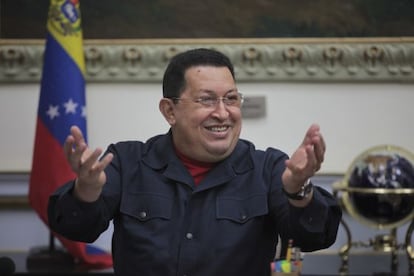Chávez’s absence sparks speculation
The recently re-elected Venezuelan president hasn't been seen in three weeks

It has been three weeks since Venezuelans last saw their president, Hugo Chávez.
Granma , the Cuban Communist Party's newspaper, on November 28 claimed an exclusive under the headline: "Chávez arrived in Havana." In a four-line summary, the government's official organ reported that the Venezuelan president, who was re-elected to an unprecedented fourth term in October, landed before dawn to continue medical treatment on the island for the cancer he was diagnosed with in June 2011.
There were no photographs. Nor were there videos of Chávez boarding the plane in Caracas as there had been in the past when his farewells before leaving for the Caribbean island for radiation and chemotherapy treatments were broadcast live and filled with parades, tears and emotional speeches. These days, official information about Chávez health is scarce.
On November 27, National Assembly president Diosdado Cabello announced in a nationwide broadcast that Chávez had asked lawmakers for permission to remain outside the country for an unspecified period. "Six months after I completed the last radiation therapy treatment, it has been recommended that I begin a special treatment consisting of various hyperbaric oxygenation sessions," he said in his letter, read by Cabello. Hyperbaric oxygenation involves breathing pure oxygen in a pressurized chamber.
In the last year, Chávez has been operated on three times to remove two malignant tumors in his pelvic area. The exact type of cancer has never been disclosed.
Nevertheless, he appeared to make a remarkable comeback to run for another six-year term, winning 55 percent of the vote and defeating opponent Henrique Capriles, who got 45 percent. The October 8 victory celebration was the last time Venezuelans saw him at a public rally. The next appearance, on November 28, was a brief one taken from a video clip showing Chávez presiding over a Cabinet meeting.
Since then, there has been no trace of the 58-year-old Chávez, the erstwhile political showman whose folksy chats about current events and international issues captured the attention of millions of his supporters who tuned to his weekly television show Álo presidente on Sundays. But it has been months since that program has aired.
"The president is doing fine; he is very well," Vice President Nicolás Maduro told journalists last weekend. "He is continuing with his treatments, and will return stronger so he can continue with his duties."
Maduro, a former foreign minister and one of Chávez's closest advisors, was appointed vice president last October. Known as one of the country's most powerful men, Maduro by law would only assume the presidency should Chávez die before his inauguration scheduled for February. If the president succumbs after taking office, the next in line would be Cabello, the National Assembly speaker and a former military officer.
Despite the speculation, Venezuelans remain either skeptical, resigned or desperate. "There is nothing wrong with that man," said Margarita Navarro, a retired nurse who describes herself as an opposition supporter.
Tu suscripción se está usando en otro dispositivo
¿Quieres añadir otro usuario a tu suscripción?
Si continúas leyendo en este dispositivo, no se podrá leer en el otro.
FlechaTu suscripción se está usando en otro dispositivo y solo puedes acceder a EL PAÍS desde un dispositivo a la vez.
Si quieres compartir tu cuenta, cambia tu suscripción a la modalidad Premium, así podrás añadir otro usuario. Cada uno accederá con su propia cuenta de email, lo que os permitirá personalizar vuestra experiencia en EL PAÍS.
¿Tienes una suscripción de empresa? Accede aquí para contratar más cuentas.
En el caso de no saber quién está usando tu cuenta, te recomendamos cambiar tu contraseña aquí.
Si decides continuar compartiendo tu cuenta, este mensaje se mostrará en tu dispositivo y en el de la otra persona que está usando tu cuenta de forma indefinida, afectando a tu experiencia de lectura. Puedes consultar aquí los términos y condiciones de la suscripción digital.








































